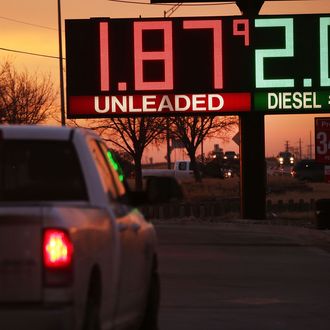
Weeks after the Royal Bank of Scotland advised its investors to “sell everything,” Citi has decided to provide its own clients with fodder for a panic attack. In a report released Thursday, the bank warned that the global economy appears to be “trapped” in a “death spiral.”
Here’s a thumbnail sketch of the deathly cycle that Citi forecasts: Weak global growth spurs demand for the U.S. dollar; a stronger U.S. dollar drives down the global price of commodities; and low commodity prices hurt developing economies dependent on exporting raw materials, thereby weakening global growth, which spurs demand for the U.S dollar, ad infinitum. This process repeats until we arrive at “Oilmageddon,” an economic apocalypse defined by perpetually low oil prices and “a ‘significant and synchronized’ global recession and a proper modern-day equity bear market,” writes Citi strategist Jonathan Stubbs.
Crude-oil prices have collapsed by 70 percent since mid-2014, while the U.S. dollar has risen by 20 percent against foreign currencies, according to CNBC.
However, Citi’s report predicts that the global economy will find its way out of this trap. Although the bank suggests a continuation of the status quo would eventually lead to ruin, it predicts that policymakers will find a way out of the status quo.
“The death spiral is in nobody’s interest. Rational behavior, most likely, will prevail,” Stubbs writes.
Specifically, Citi expects oil producers to cut costs and production, allowing the sector to find a stable floor — with the aid of policy measures to contain the dollar’s strength.
On the policy front, it’s not entirely clear what Citi is expecting. While the Federal Reserve did lift benchmark interest rates off the lower bound in December, they remain close to zero, and yet the dollar remains strong. In recent days, some have speculated that the Federal Reserve might consider experimenting with negative interest rates — effectively charging people money for the privilege of storing their wealth in banks — as Sweden’s central bank has done. But considering that the Fed just raised interest rates despite low inflation in order to preserve the lower bound as a policy tool, it seems doubtful Janet Yellen would follow Sweden’s radical example.
Regardless, Citi is bearish on the prospects for global growth. Whereas the International Monetary Fund expects the world economy to expand by 3.4 percent in 2016, Citi puts that figure at 2.7.
On Friday, the Labor Department announced that U.S. job growth fell short of expectations in January, with employers adding only 151,000 new positions to their payrolls. The American economy is still in better shape than those of most of its peers, but the report adds to concerns that domestic growth may be slowing.
Of course, in Citi’s view, slow growth will be the least of our worries if the world’s political and economic leaders don’t take action to combat “Oilmageddon.”
“The stakes are high,” Stubbs writes. “Perhaps higher than they have ever been in the post-World War II era.”






























